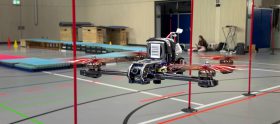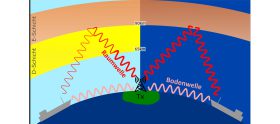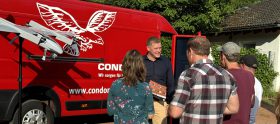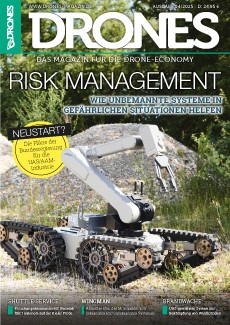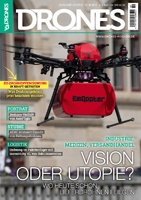South West England innovators collaborate to develop enhanced solutions for seagrass monitoring
Exeter, United Kingdom, 28 July 2022: A new, non-invasive method to measure and monitor seagrass biomass on the seabed around England’s South West coast is being developed as part of an ongoing, collaborative project.
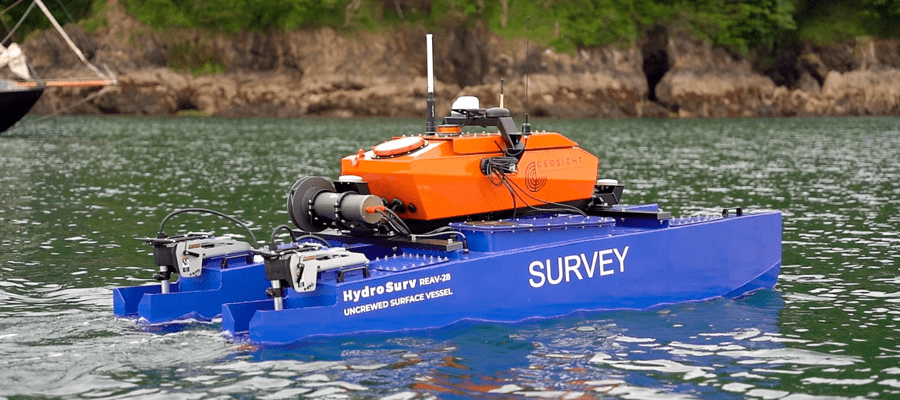
The innovative new technique is currently being trialled by local companies HydroSurv and Valeport, working with the University of Plymouth and Natural England, and supported by a grant of more than £266,000 from Innovate UK’s Smart Grants programme.
It builds on the concept of the acoustic reflectivity of seagrass providing valuable information to characterise submerged aquatic vegetation. A full-stack solution consisting of a Valeport VA500 altimeter installed onto a HydroSurv REAV-28 Uncrewed Surface Vessel (USV), specifically developed for this project, provides a non-invasive, cost-effective platform to survey seagrass sites. A large, validated signal library and deep learning algorithm, developed by the University of Plymouth, deciphers the survey data to predict seagrass distribution. The data is visualised and interpreted within a cloud application created by HydroSurv.
The USV platform facilitates accurate repeat surveys that can be compared to monitor temporal changes in seagrass coverage for the planning of protection and regeneration projects at biodiversity-rich worksites. The full solution, which was demonstrated successfully to project stakeholders for the first time in May this year, is set to change the way seagrass meadows are monitored in the future, complementing traditional diver surveys to cover much larger areas and enable rapid re-survey work as required.
Fiona Crouch, Natural England ReMEDIES Project Manager said: “To effectively conserve and restore seagrass meadows we need innovative solutions to enable cost effective, repeatable surveys of established meadows, plus areas being restored through projects such as ReMEDIES, to monitor change. I’m really excited to see where this new technology will take us in supporting our seagrass conservation efforts.”
HydroSurv, Valeport and the University of Plymouth form part of a fast-emerging South West England maritime innovation cluster. The project partners are engaging with the Environment Agency and Natural England to develop the solution further, with a second phase of demonstrations planned for September.
David Hull, Founder and CEO of HydroSurv said: “Staying true to our values of ocean and environmental stewardship, the work being carried out within this collaborative project will directly translate into impact addressing UN Sustainable Development Goal 14, ‘Life below water’. The ability to provide blended, non-invasive solutions that rapidly acquire, process and visualise the coverage and density of seagrass meadows is central to improving our understanding of these vital ecosystems and delivering regular and repeatable resurveys instride with the needs of coastal practitioners.”
The VA500 altimeter, which uses state of the art signal processing, was customised by the instrument manufacturer for this project.
Jim Gardiner, Research Scientist at Valeport said: “The VA500 altimeter was developed to deliver reliable underwater range measurements in a compact, robust package. Working with University of Plymouth and HydroSurv, custom firmware was developed to deliver low noise, high quality, correlated acoustic profiles at up to 10Hz to enable deeper analysis, exploration, mapping and classification of the acoustic information gathered by the VA500.”
Dr Tim Scott, Associate Professor of Ocean Exploration at the University of Plymouth, said: “As part of the project, the application of deep learning algorithms for the acoustic detection and characterisation of seagrass beds has introduced improved accuracy and efficiency over more traditional techniques. When combined with the advantages of lightweight autonomous survey platforms, this new combined survey solution introduces a step-change in accurate and repeatable seagrass mapping.”
Seagrass meadows are a crucial part of the marine ecosystem and are increasingly being recognised for their essential carbon capture abilities. As well as being as effective at storing carbon as woodland, seagrass also provides vital habitat for young fish, seahorses and jellyfish. It additionally cleans surrounding seawater and helps to stabilise the seabed, thereby reducing coastal erosion.
The UK has lost around half of its seagrass since the mid-1930s due to factors ranging from seagrass wasting disease (SWD) and pollution to physical disturbance from the anchoring, launching and mooring of leisure boats. The £2.5 million LIFE Recreation ReMEDIES partnership ‘Save Our Seabed’, led by Natural England and funded by the EU LIFE Programme, was launched in July 2019 to protect and restore these sensitive habitats.
About HydroSurv
HydroSurv is a global innovator in Uncrewed Surface Vehicles (USVs) that democratise marine geospatial data for the ocean industries. With a range of electric and hybrid USVs from 1.6 – 5.7m for inland, nearshore and offshore operations, HydroSurv delivers a blended offering of USV platform sales, leasing anddesign engineering.
www.hydro-surv.com
About Valeport
Valeport is one of the UK’s leading manufacturers of oceanographic and hydrographic instrumentation. Valeport has supplied to the subsea sector since it was established in 1969 and supplies a worldwide customer base that includes: defence, environmental, oil and gas, renewable energy, construction and dredging sectors.
www.valeport.co.uk
About University of Plymouth
The University of Plymouth is renowned for high quality, internationally-leading education, research and innovation. With a mission to Advance Knowledge and Transform Lives, Plymouth is a world class research university and continues to drive the global debate in disciplines including marine and maritime, sustainability, health technologies and climate action. A three-time winner of the Queen’s Anniversary Prize for Higher and Further Education, most recently in 2020 in respect of its pioneering research on microplastics pollution in the ocean, the University continues to grow in stature and reputation. It has a strong track record for teaching and learning excellence, and has one of the highest numbers of National Teaching Fellows of any UK university. With over 18,000 students, a further 7,000 studying for a Plymouth degree at partner institutions in the UK and around the world, and over 140,000 alumni pursuing their chosen careers globally, it has a growing global presence.
http://www.plymouth.ac.uk
About LIFE Recreation ReMEDIES
LIFE Recreation ReMEDIES is a £2.5 million, four-year marine conservation project to Save Our Seabed at five Special Areas of Conservation along England’s south coast, through seagrass restoration, education and innovation. It is funded by the EU LIFE programme and led by Natural England in partnership with Marine Conservation Society, Ocean Conservation Trust, Plymouth City Council/Tamar Estuaries Consultative Forum and Royal Yachting Association.
https://saveourseabed.co.uk/
Im Drones PR-Portal erscheinen Nachrichten und Meldungen von Unternehmen aus der Drone-Economy. Für die Inhalte der Pressemitteilungen sind die jeweiligen Unternehmen verantwortlich.


